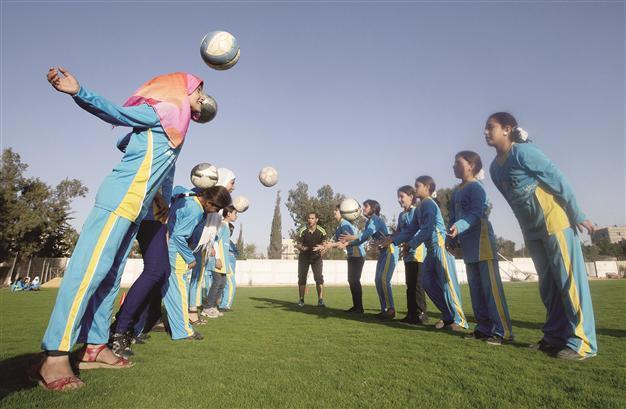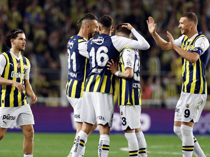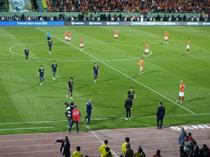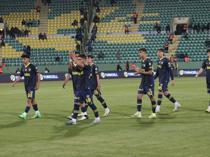FIFA braces for Israeli-Palestinian showdown
James M. DORSEY

Palestinian girls take part in a training session at the Beit Lahia football club in the northern Gaza strip, on April 28 as part of an after-school sport program funded by the Palestine Association for Children’s Encouragement of Sports. AFP photo
The scene is set at next month’s World Cup in Brazil for a showdown between Israel and Palestine – albeit off the pitch, given that neither qualified for one of the world’s most important sporting events.The looming battle in the congress in Sao Paolo of world soccer body FIFA reflects Palestinian efforts to isolate Israel internationally and undermine its legitimacy in the wake of the breakdown of moribund peace negotiations as well as Israeli concern that growing opposition to its policy toward the Palestinians potentially constitutes as great a threat as Iran becoming a nuclear power.
The campaign by the Palestine Authority headed by President Mahmoud Abbas to gain recognition as a state by joining a multitude of United Nations organizations and pushing for condemnation of Israel if not suspension of Israeli membership includes an effort by the Palestine Football Federation (PFF) to sanction Israel for obstructing Palestinian football.
The effort to persuade FIFA to expel Israel comes as plans to form a unity government that groups the Palestinians’ two rival political factions – Mr. Abbas’ Fatah movement and Islamist militia Hamas which controls the Gaza Strip – is meeting less international resistance than either Israel or Palestine had hoped for or expected.
Israel, which has vowed not to negotiate with Hamas as long as it refuses to recognize the Jewish state and renounce armed struggle had hoped that its allies, the United States and the European Union, would back its refusal to deal with a Palestinian government that includes Hamas, an offshoot of the Muslim Brotherhood. Gen. Amos Gilad, the Israeli Defense Ministry’s director of policy and political-military relations, charged that the unity government was intended “to undermine our legitimacy around the world.”
His concern seemed to be borne out by diplomats of the EU which has plans to boycott Israeli products made in the West Bank. The diplomats cautiously welcomed the unity government.
The split between Fatah and Hamas was one reason why Israeli-Palestinian peace talks were stillborn. The EU has said it would continue to fund the Palestinian government provided it maintained its recognition of Israel and its agreements with Israel and continues to disavow violence. Fatah and Hamas have agreed that their government to be populated by technocrats would honor past Palestinian agreements with Israel.
The EU put its plans to boycott Israeli products from occupied territories on hold to give the U.S.-mediated peace talks a chance. A declaration of the boycott would boost the Boycott, Disinvestment and Sanctions (BDS) movement that has gained currency in academic and artistic circles, as well as among some prominent European football players. The movement lobbies for a boycott of Israel in a bid to force it to withdraw from territory it occupied during the 1967 Middle East war.
No sanctions
Israel is likely to find solace in FIFA President Sepp Blatter’s vow at the end of a visit this week to Jordan, Israel and the West Bank designed to avoid a showdown at the football body’s congress not to sanction the Jewish state.
In a statement that flies in the face of reality in a region in which politics is written into the DNA of football, Mr. Blatter asserted that “I separate politics and sport.” Both Israel and Palestine see football as a means of projecting themselves on the international stage and building soft power. PFF President Gen. Jibril Rajoub, a former head of Palestine’s Preventive Security Force and a member of Fatah’s Central Committee, has ambitions to succeed 79-year-old Mr. Abbas as Palestinian president.
“I don’t know on what items the FIFA Congress should take action against the IFA [Israel Football Association], if they are [acting] according to the statutes and regulations of FIFA. So far, we haven’t seen any breach of regulations... until then, who could take action against somebody who is a good member of FIFA? I can tell you that your federation is a good standing member,” Mr. Blatter said in Jerusalem, turning to IFA president Avi Luzon.
Mr. Blatter’s had hoped that his visit would rectify the failure of a FIFA task force established to mediate between the PFF and the IFA and address Palestinian disappointment in the effectiveness of a hotline between the two groups that was intended to solve problems such as Palestinian players being delayed at Israeli checkpoints.
Mr. Rajoub’s latest push for sanctions against Israel follows the recent delay by Israel of the entry into the West Bank of Arab players as well as a Pakistani team coached by a Bahraini national who were slated to play in a tournament organized by the PFF. The tournament was named al-Nakba or The Catastrophe, the Palestinian term used for the Israeli expulsion of Palestinians during the 1948 war in which Israel gained its independence.
The PFF has long asserted that Israel undermines the Palestinian game by restricting the freedom of movement of players, coaches and executives. Tension flared earlier this year when Israeli forces shot and severely wounded two Palestinian youth players in the legs and feet in unclear circumstances.
Palestinians hope Israel changes its ways
Mr. Abbas has backed the PFF campaign, asserting that FIFA needed to “hold to account” the IFA. “The Israeli government is placing obstacles in the way of the PFA’s activities, in contravention of international law and the regulations of FIFA,” Mr. Abbas said.
The IFA has countered PFF charges that Israel is deliberately undermining the development of Palestinian football by asserting that areas used by the PFF have been utilized for rocket launches at Israeli targets.
In the absence of Israel’s expulsion by FIFA, the PFF hopes that its campaign will ease Israeli impediments on Palestinian football. “It will force the Israelis to change their ways. Pressure is the only language that they understand,” said a Palestinian sports journalist.
















